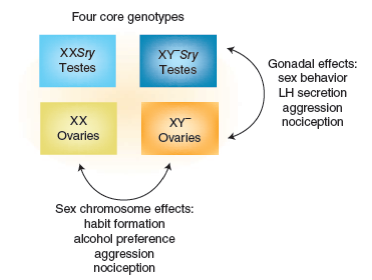PSY 2007 - Sex Differences
1/19
Earn XP
Description and Tags
bibidibabidibo
Name | Mastery | Learn | Test | Matching | Spaced |
|---|
No study sessions yet.
20 Terms
Neurotransmitters
Chemical messengers in the brain
–From one neuron to the next
–Local action
–Effects can be activation or inhibition, depending on the transmitter/receptor combination
Hormones
Chemical messenger in the body
–Through the bloodstream
–Global action
–Effects can be varied, depending on the hormone/receptor combination
SRY Gene
Located on the Y-chromosome
Turns the fetal gonad into a testis (2 testes) - Testis-Determining Factor.
In its absence, the gonad becomes an ovary.
Early testis produces 2 types of hormones
–Anti-Mullerian Hormone (defeminising)
–Androgens (masculinising)
•In the absence of these hormones, female sex organs develop (primary sexual characters)
Organizational Effect (action of hormones)
Effect remains after the hormone has been removed. Often occurs during a sensitive period.
Activational Effect (action of hormones)
Effect is reversible, depending on presence or absence of hormone.
Puberty
•Organizational and activational role of sex hormones
•Development of Secondary Sexual Characters
•Pubic and axillary hair are androgen (androstenedione) sensitive in both males and females
•During childhood, sex hormone levels are almost undetectably low
•Developmental timing mechanism starts puberty
•Sex differences in mechanisms and timing
Gonadotropin-Releasing Hormones (GnRH)
Starts off Puberty
Move from hypothalamus to anterior pituitary gland to trigger sexual maturation
Gonadotropins (FSH & LH) in different sex
Male: Sperm production (FSH) & Testosterone production.(LH)
Female: Cause follicles to ripen (FSH) & Induce ovulation and formation of Corpus Luteum.(LH)
Hypothalamus-Pituitary-Gonadal Axis
negative feedback system, regulation of gondal hormones
Keep testostrone at an optimal point
Androgen insensitivity syndrome
•Gonads develop as testes
•Androgen receptors do not work
•Testosterone cannot do its normal job
•46, XY individuals develop anatomically as female, but without internal female genitalia
Puberty is typically late, sometimes helped with hormone supplements
They typically identify as women
5α-reductase deficiency
•5α-reductase turns testosterone into DHT
•DHT is crucial for prenatal external genital development
•46, XY children are born with female external genitalia, but male internal genitalia
At puberty, the high levels of testosterone can “mimic” DHT
They develop male genitalia (“Guevedoces”)
After puberty, they mostly identify as men
Congenital Adrenal Hyperplasia
•High levels of prenatal testosterone in girls
•Ambiguous external genitalia in girls
•Often treated once diagnosed
•Some 46,XX children assigned male at birth
•5% of CAH girls assigned female at birth have gender dysphoria
•12% of CAH “girls” assigned male at birth have gender dysphoria
Four core genotypes
•By comparing the two rows to each other, you can find those sex differences that are due to the organizational effects (or activationaleffects if later in life) of testosterone ONLY
•By comparing the two columns to each other, you can find those sex differences that are due to genetic differences between males and females (presumably other genes on X and/or Y chromosomes).

Anti-Mullerian Hormone
Hormone produced by the early testis that causes defeminisation.
Male Sex Determination in Mammals (Hormones)
Primordial gonads develop into testes; androgens cause masculinization; Wolffian system develops into vas deferens, seminal vesicles, prostate; primordial external genitalia develop into penis and scrotum.
Female Sex Determination in Mammals (Hormones)
Primordial gonads develop into ovaries; Mullerian system develops into fimbriae, fallopian tubes, uterus, inner vagina; Wolffian system withers away; primordial external genitalia develop into clitoris, labia, outer vagina.
Neurotransmitters
Effects can be activation or inhibition, depending on the transmitter/receptor combination
Sexual Orientation
•One of the most extreme sex differences
•90-95% of human males are attracted to human females exclusively (“gynophile”)
•85-90% of human females are attracted to human males exclusively (“androphile”)
Structural differences (Sex differentiation in the brain)
•Male brains are ~ 10% larger
•Female cortex is thicker (more grey matter)
•Males have larger white matter volume & subcortical structures